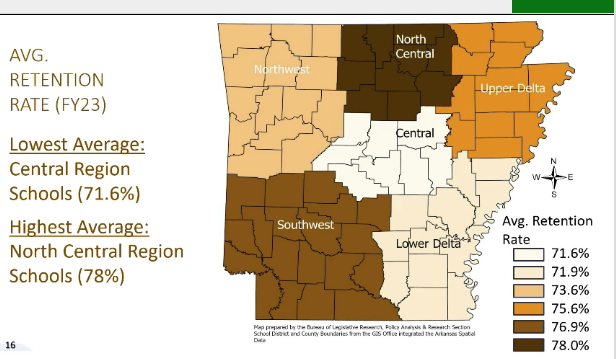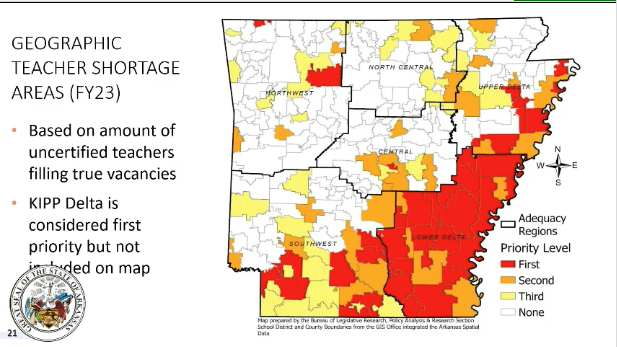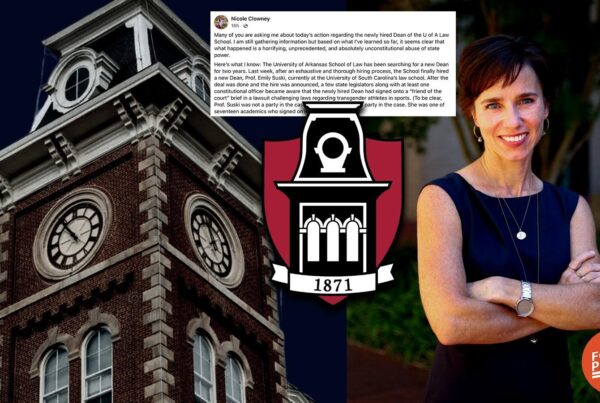First meaningful look at teacher merit pay and educator retention shows additional LEARNS weaknesses
The Joint Education Committee met this week to examine one of the state’s new LEARNS programs and to hear from researchers on the issue of educator retention. Though presentations were split up, there’s a common thread woven into Arkansas’s most pressing education problems: the LEARNS Act.
We’re all fairly familiar now with Governor Sanders’ signature but controversial piece of legislation, which expanded vouchers to subsidize tuition for private school families. LEARNS also replaced the previous pay structure for teachers, which was based on experience and seniority, with a merit-based system. The new approach, touted by supporters for its competitive, business-like nature, forces educators to compete for bonuses from a limited pool of funds.

The result is a high-stakes environment typically found in sales-driven industries, not public education. We talked about this last year when LEARNS legislation was filed. Some state Republican lawmakers are not shy about wanting to commodify public ed; there’s a big push to turn our education system into a business, and universal vouchers have given us a head start.
This week’s committee presentation confirms what we suspected: only a small fraction of educators have received bonuses so far under the new merit pay structure — a meager 10% to be exact. With more than 30,000 teachers in the state, there’s a big question of fairness here.
There is also the long-term impact on teacher retention. Senator Linda Chesterfield, former educator and past president of the Arkansas Education Association, aptly questioned how teachers would remain motivated if they had to work for years without a salary increase. The Department of Education didn’t really have an answer for her, highlighting the strain the new system places on current educators facing flat salary rates regardless of tenure.
Despite all the LEARNS lauding, the picture for public education remains grim, especially if you’re a kid in the southeastern portion of the state. The data clearly show that districts with higher numbers of reduced or free school lunches and larger minority populations are hemorrhaging teachers. Unsurprisingly, teachers listed stress, workload, and a lack of respect for the profession as the top reasons they are exiting the field.
This dissatisfaction is exacerbated by concerns over job security tied to student performance — a clear indication that the current system is failing to support the very professionals on which it relies.

A bit more on the dire situation in the Delta: teacher shortages in the area are made worse by long-standing socioeconomic challenges. Schools serving Black student populations are historically underfunded and have struggled for decades to provide quality education due to systemic neglect and a lack of resources.
This isn’t a merit situation, folks. We should not force a high-stakes pay program on educators who are already teaching with insurmountable challenges. And opening private schools (for white kids) sure as hell won’t solve the problem. Our state funds what it cares about, and this region is woefully underfunded.
Without adequate support and investment, opportunity for students in the region simply doesn’t exist, as education is a critical driver of economic mobility. The LEARNS Act is a low blow to these schools, their teachers, and especially their students.
Maybe this is why our governor and our education secretary continue their marketing campaign for the LEARNS Act nearly a year and a half after its enactment. The policy is just not popular, and it’s because Arkansans see through it. This is especially true of our public educators, rural residents, and those in historically oppressed communities.
We know a bait and switch when we see one. Arkansas’s kids deserve a world-class public school education, no matter where they live. Merit pay systems and poor retention rates are just the latest confirmation that LEARNS is hurting our state and wrecking public education.





